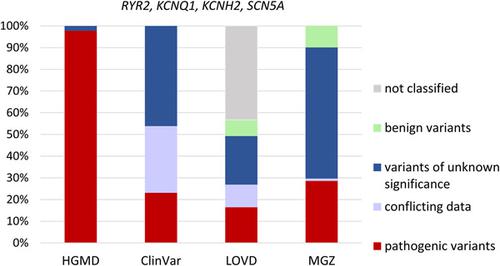当前位置:
X-MOL 学术
›
Hum. Mutat.
›
论文详情
Our official English website, www.x-mol.net, welcomes your feedback! (Note: you will need to create a separate account there.)
Critical assessment of secondary findings in genes linked to primary arrhythmia syndromes.
Human Mutation ( IF 3.9 ) Pub Date : 2020-02-18 , DOI: 10.1002/humu.23996 Isabel Diebold 1, 2 , Ulrike Schön 1 , Florentine Scharf 1 , Anna Benet-Pagès 1 , Andreas Laner 1 , Elke Holinski-Feder 1 , Angela Abicht 1, 3
Human Mutation ( IF 3.9 ) Pub Date : 2020-02-18 , DOI: 10.1002/humu.23996 Isabel Diebold 1, 2 , Ulrike Schön 1 , Florentine Scharf 1 , Anna Benet-Pagès 1 , Andreas Laner 1 , Elke Holinski-Feder 1 , Angela Abicht 1, 3
Affiliation

|
As comprehensive sequencing technologies gain widespread use, questions about so-called secondary findings (SF) require urgent consideration. The American College of Medical Genetics and Genomics has recommended to report SF in 59 genes (ACMG SF v2.0) including four actionable genes associated with inherited primary arrhythmia syndromes (IPAS) such as catecholaminergic polymorphic ventricular tachycardia, long QT syndrome, and Brugada syndrome. Databases provide conflicting results for the purpose of identifying pathogenic variants in SF associated with IPAS at a level of sufficient evidence for clinical return. As IPAS account for a significant proportion of sudden cardiac deaths (SCD) in young and apparently healthy individuals, variant interpretation has a great impact on diagnosis and prevention of disease. Of 6381 individuals, 0.4% carry pathogenic variants in one of the four actionable genes related to IPAS: RYR2, KCNQ1, KCNH2, and SCN5A. Comparison of the databases ClinVar, Leiden Open-source Variant Database, and Human Gene Mutation Database showed impactful differences (0.2% to 1.3%) in variant interpretation improvable by expert-curation depending on database and classification system used. These data further highlight the need for international consensus regarding the variant interpretation, and subsequently management of SF in particular with regard to treatable arrhythmic disorders with increased risk of SCD.
中文翻译:

对与原发性心律不齐综合征相关的基因的次要发现进行严格评估。
随着综合测序技术的广泛使用,关于所谓的次要发现(SF)的问题需要紧急考虑。美国医学遗传学和基因组学学院建议报告SF中的59个基因(ACMG SF v2.0),包括与遗传性原发性心律不齐综合征(IPAS)相关的四个可操作基因,例如儿茶酚胺能性多形性室性心动过速,长QT综合征和Brugada综合征。数据库提供了相互矛盾的结果,目的是在足够的临床回报证据水平上鉴定与IPAS相关的SF中的致病变异。由于IPAS在年轻且显然健康的个体中导致心脏性猝死(SCD)的比例很高,因此变异解释对疾病的诊断和预防具有重大影响。在6381个人中,0。4%的患者在与IPAS相关的四个可操作基因之一中携带致病性变体:RYR2,KCNQ1,KCNH2和SCN5A。数据库ClinVar,Leiden开源变体数据库和人类基因突变数据库的比较表明,专家解释可根据所使用的数据库和分类系统在变异解释方面产生显着差异(0.2%至1.3%)。这些数据进一步强调了关于变体解释以及随后的SF治疗,尤其是对于可治疗的心律失常性疾病以及SCD风险增加的国际共识的需求。3%)的变体解释可通过专家咨询小组改进,具体取决于所使用的数据库和分类系统。这些数据进一步强调了关于变体解释以及随后的SF治疗,尤其是对于可治疗的心律失常性疾病以及SCD风险增加的国际共识的需求。根据使用的数据库和分类系统,专家解释可以提高变体解释的3%)。这些数据进一步强调了关于变体解释以及随后的SF治疗,尤其是对于可治疗的心律失常性疾病以及SCD风险增加的国际共识的需求。
更新日期:2020-02-18
中文翻译:

对与原发性心律不齐综合征相关的基因的次要发现进行严格评估。
随着综合测序技术的广泛使用,关于所谓的次要发现(SF)的问题需要紧急考虑。美国医学遗传学和基因组学学院建议报告SF中的59个基因(ACMG SF v2.0),包括与遗传性原发性心律不齐综合征(IPAS)相关的四个可操作基因,例如儿茶酚胺能性多形性室性心动过速,长QT综合征和Brugada综合征。数据库提供了相互矛盾的结果,目的是在足够的临床回报证据水平上鉴定与IPAS相关的SF中的致病变异。由于IPAS在年轻且显然健康的个体中导致心脏性猝死(SCD)的比例很高,因此变异解释对疾病的诊断和预防具有重大影响。在6381个人中,0。4%的患者在与IPAS相关的四个可操作基因之一中携带致病性变体:RYR2,KCNQ1,KCNH2和SCN5A。数据库ClinVar,Leiden开源变体数据库和人类基因突变数据库的比较表明,专家解释可根据所使用的数据库和分类系统在变异解释方面产生显着差异(0.2%至1.3%)。这些数据进一步强调了关于变体解释以及随后的SF治疗,尤其是对于可治疗的心律失常性疾病以及SCD风险增加的国际共识的需求。3%)的变体解释可通过专家咨询小组改进,具体取决于所使用的数据库和分类系统。这些数据进一步强调了关于变体解释以及随后的SF治疗,尤其是对于可治疗的心律失常性疾病以及SCD风险增加的国际共识的需求。根据使用的数据库和分类系统,专家解释可以提高变体解释的3%)。这些数据进一步强调了关于变体解释以及随后的SF治疗,尤其是对于可治疗的心律失常性疾病以及SCD风险增加的国际共识的需求。


























 京公网安备 11010802027423号
京公网安备 11010802027423号